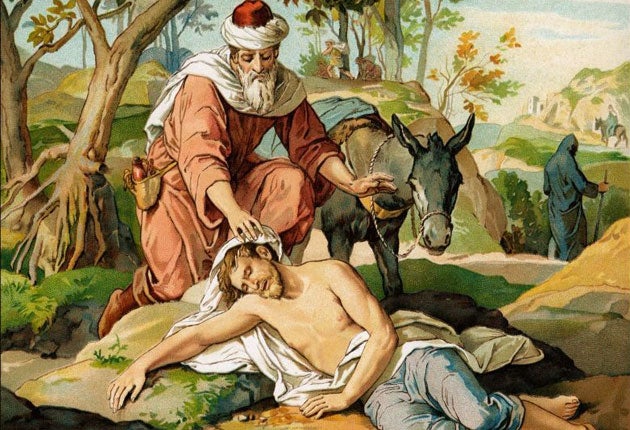War, what is it good for? It made us less selfish
Scientists explain how altruism evolved over 200,000 years of conflict

One of the defining characteristics of being human is the supreme act of personal sacrifice needed to lay down one's life for the good of the group – but could such altruism be hard-wired in our genes as a result of Darwinian evolution?
Biologists have argued for decades about the evolution of altruism and long ago came to the conclusion that Darwinian natural selection cannot explain acts of supreme personal sacrifice except those directly connected with helping the survival of close blood relatives who share similar genes.
But now a study has suggested that altruism in prehistoric human societies may after all have resulted from a form of natural selection caused by a state of near-continual warfare between competing tribes of hunter gatherers, an idea that Charles Darwin himself first suggested in his 1873 book The Descent of Man.
A scientist has suggested that because so many of the 200,000 years of human history were spent during our hunter-gatherer phase, before the invention of agriculture, less than 10,000 years ago, this long period in our evolutionary history shaped our social behaviour. Moreover, he believes that altruism may have evolved directly as a result of tribal warfare because personal sacrifice was the key that enabled one group to be victorious over another.
Samuel Bowles, of the Santa Fe Institute in New Mexico, said: "Warfare was sufficiently common and lethal among our ancestors to favour the evolution of what I call parochial altruism, a predisposition to be co-operative towards group members and hostile towards outsiders.
"Biologists and economists have doubted that a genetic predisposition to behave altruistically – to help others at a cost to oneself – could evolve, excepting the help extended to close genetic relatives."
In his study, published in the journal Science, Dr Bowles takes on the proponents of the selfish-gene theory of human evolution by suggesting that natural selection worked on groups of people co-operating together, rather than just individuals.
Drawing on archaeological data from the Stone Age and ethnographic studies of latter-day tribes of hunter-gatherers, Dr Bowles concluded that it was possible for altruism to have evolved by Darwinian selection – if the warfare was intense enough between competing tribes and there were sufficient genetic differences between these human groups.
He has showed that genetic differences between human groups were indeed greater than previously thought, and that warfare was a near-continual activity that must have shaped early human social behaviour. As a result, altruistic acts of personal sacrifice helped one group to survive in favour of another, he said.
Dr Bowles said that the "altruistic warrior" theory is just one scenario that could explain the evolution of altruism in early human societies. "[The] willingness to take mortal risks as a fighter is not the only form of altruism... more altruistic and hence more co-operative groups may be more productive and sustain healthier, stronger, or more numerous members, for example, or make more effective use of information," he said.
Ruth Mace, an anthropologist at University College London, said Dr Bowles' study went against the accepted idea of the selfish-gene theory which long ago rejected the proposal that natural selection worked at the level of the group rather than the individual.
"Recent literature on social evolution has reopened the debate, arguing that in some circumstances group selection might be important, especially in a cultural species like humans," she said.
In a separate study published in Science, scientists proposed that a key driver that led to the evolution of the other defining attributes of being human – such as sophisticated tool making and the development of art and culture – resulted from population growth rather than biological changes.
Scientist from University College London say they believe the sudden emergence of human cultural traits such as art came about when population density passed a certain threshold, allowing the free exchange of ideas.
Subscribe to Independent Premium to bookmark this article
Want to bookmark your favourite articles and stories to read or reference later? Start your Independent Premium subscription today.

Join our commenting forum
Join thought-provoking conversations, follow other Independent readers and see their replies